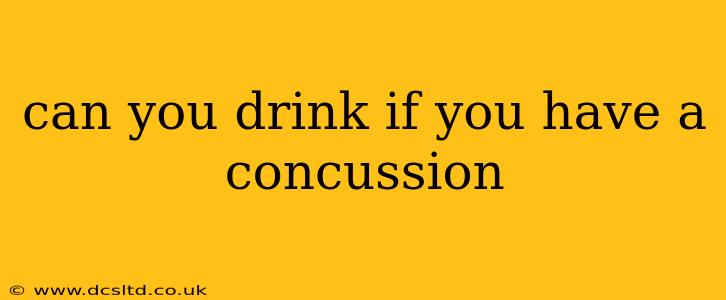A concussion, also known as a mild traumatic brain injury (mTBI), is a serious injury that disrupts the normal function of your brain. While it might seem like a minor setback, the recovery process requires careful attention to rest and avoiding anything that could further stress your brain. This includes alcohol. The simple answer is no, you should absolutely not drink alcohol if you have a concussion. There are several compelling reasons for this, and understanding them is crucial for a safe and effective recovery.
Why Alcohol is Harmful After a Concussion
Alcohol acts as a depressant on the central nervous system. This means it slows down brain activity, and when your brain is already recovering from a concussion, this added stress can significantly hinder the healing process. Here's a breakdown of the negative impacts:
-
Increased Inflammation: A concussion causes inflammation in the brain. Alcohol can exacerbate this inflammation, prolonging your recovery time and potentially leading to more severe complications.
-
Delayed Healing: Your brain needs time to repair itself after a concussion. Alcohol interferes with this repair process, slowing down the healing of damaged brain cells and potentially leading to longer-term cognitive difficulties.
-
Increased Risk of Complications: Studies suggest that alcohol consumption after a concussion may increase the risk of post-concussion syndrome (PCS), a condition characterized by persistent symptoms like headaches, dizziness, and cognitive impairment.
-
Impaired Cognitive Function: Alcohol further impairs cognitive function already affected by a concussion. This can manifest as difficulty concentrating, memory problems, and slowed processing speed.
-
Medication Interactions: If you're prescribed medication for your concussion symptoms, alcohol can interact dangerously with these drugs, potentially leading to adverse effects or reduced efficacy.
How Long Should You Avoid Alcohol After a Concussion?
The duration of alcohol abstinence after a concussion depends on the severity of your injury and your individual recovery progress. It's best to avoid alcohol entirely until you receive clearance from your doctor. This could range from several weeks to several months. Rushing the process by consuming alcohol could severely impact your long-term recovery.
What Happens If You Drink Alcohol After a Concussion?
The consequences of drinking alcohol after a concussion can range from mild to severe. You might experience worsening of existing symptoms like headaches or dizziness, prolonged cognitive impairment, or even a delay in overall recovery. In rare cases, excessive alcohol consumption could lead to more severe complications.
What Else Should I Avoid After a Concussion?
Besides alcohol, it's crucial to avoid other potentially harmful activities during your recovery. This includes:
- Strenuous physical activity: Avoid intense exercise or activities that could lead to another head injury.
- Exposure to bright lights or loud noises: These stimuli can exacerbate concussion symptoms.
- Driving or operating machinery: Your impaired cognitive function could pose a significant safety risk.
Can I Drink Alcohol If I've Had a Concussion in the Past?
Even if you've fully recovered from a previous concussion, it's generally recommended to exercise caution regarding alcohol consumption, particularly if you're experiencing any lingering symptoms. Consult your doctor for personalized advice.
Remember, every individual's recovery from a concussion is unique. Always consult with your doctor or a healthcare professional for personalized advice regarding alcohol consumption and any other concerns related to your recovery. Your health and safety are paramount. Don't hesitate to seek professional medical guidance.
